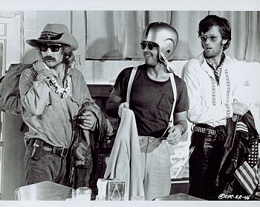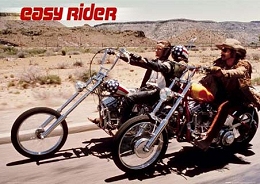
I
was utterly surprised by this film. I was expecting nothing more than
some short scenes of our now-infamous actors smoking marijuana followed
by trippy Willy Wonka scenes . Oddly, this did occur, but this film was
much more than that. This film should be shown in every American History
class in the United States. It not only showed the beauty of the country
of which we reside, but it also spoke about the people that reside in
it. You know the old saying, "Guns don`t kill people, people kill
people", well after watching this film, it is a very true statement.
We are afraid of what is different.
 We
are a culture that is afraid of change, yet seek it so badly. We are a
society of hypocrites, androids, and ignorants. We thrive on the fact
that we are the best country in the world, yet somebody shows any disassociation
of routine, we are the first to question and get angry. I would dare say
that we have moved so far from the 60s that I cannot see why our parents
do not cry everyday. Their generations was a free-spirited, mind challenging
culture that explored all possibilities no matter the cost. The experience
was all they needed as a reward. Now, we are more concerned about money
and the family-plan that we sometimes place ourselves on the backburner
to life. Wake, eat, and pay the bills. What a sad daily structure that
we have. When was the last time you considered the possibility of just
jumping on your bike and riding until you hit water? Probably not for
a long time ... why? It is called "bills" and "responsibilities".
These are the choices that we chose to make, and for anyone to say that
they cannot do it, I would have to challenge. You CAN do anything, it
is whether you chose to do it is another question. I wonder what it will
be like in another 30 years. Where will we be, and will the idea of individualism
be lost? I can't wait to see ...
We
are a culture that is afraid of change, yet seek it so badly. We are a
society of hypocrites, androids, and ignorants. We thrive on the fact
that we are the best country in the world, yet somebody shows any disassociation
of routine, we are the first to question and get angry. I would dare say
that we have moved so far from the 60s that I cannot see why our parents
do not cry everyday. Their generations was a free-spirited, mind challenging
culture that explored all possibilities no matter the cost. The experience
was all they needed as a reward. Now, we are more concerned about money
and the family-plan that we sometimes place ourselves on the backburner
to life. Wake, eat, and pay the bills. What a sad daily structure that
we have. When was the last time you considered the possibility of just
jumping on your bike and riding until you hit water? Probably not for
a long time ... why? It is called "bills" and "responsibilities".
These are the choices that we chose to make, and for anyone to say that
they cannot do it, I would have to challenge. You CAN do anything, it
is whether you chose to do it is another question. I wonder what it will
be like in another 30 years. Where will we be, and will the idea of individualism
be lost? I can't wait to see ...
 Outside
of the deeply rooted themes of this film, I felt that Hopper (who also
directed) knew exactly what he was doing behind the camera. He kept the
talking short, the music loud and symbolic, and allowed the background
to do the explaining. I loved the fact that we really knew nothing about
Fonda or Hopper's characters. It allowed us to relate to them. You could
easily add your story into their characters and have the life that you
lead and wish to escape. Hopper was able to transform this film from a
drug movie to a film about humanity. Fonda, who also helped write the
film with Hopper, did a superb job of adding Nicholson's character into
the mix.
Outside
of the deeply rooted themes of this film, I felt that Hopper (who also
directed) knew exactly what he was doing behind the camera. He kept the
talking short, the music loud and symbolic, and allowed the background
to do the explaining. I loved the fact that we really knew nothing about
Fonda or Hopper's characters. It allowed us to relate to them. You could
easily add your story into their characters and have the life that you
lead and wish to escape. Hopper was able to transform this film from a
drug movie to a film about humanity. Fonda, who also helped write the
film with Hopper, did a superb job of adding Nicholson's character into
the mix.
Nicholson represented us, the American public and our love of liquor, football, and lies. I viewed Nicholson as the average American. He drank too much, was the product of a wealthy upbringing, but did not know much about the world. He was sheltered. He never smoked weed (in fact didn't even know what it was when presented to him), never left the state line, and never lived life. He constantly used the expression, "I have always wanted to ...". How many times do you hear this a day from either a family member or a co-worker? If you always wanted to do it, why haven't you? So, here we have Hanson, dreaming a dream but never following through, who is traveling with two guys that live the ultimate life and live by their own rules. They are complete opposites, but Hanson's words seemed to remain in my mind for a long time. He reminded me of one of my wife's students today that spoke about freedom. He knew exactly what it was, but never practiced it. Hopper and Fonda were walking (driving most of the time) representations of the word "freedom". It is tragic what happens to Harmon, because he (unfortunately) experienced the negative side of freedom ... hatred and fear of the unknown.
Advertise in Savage Cinema • Contact Us
Copyright © 2002-2005 Savage Cinema. All rights reserved.